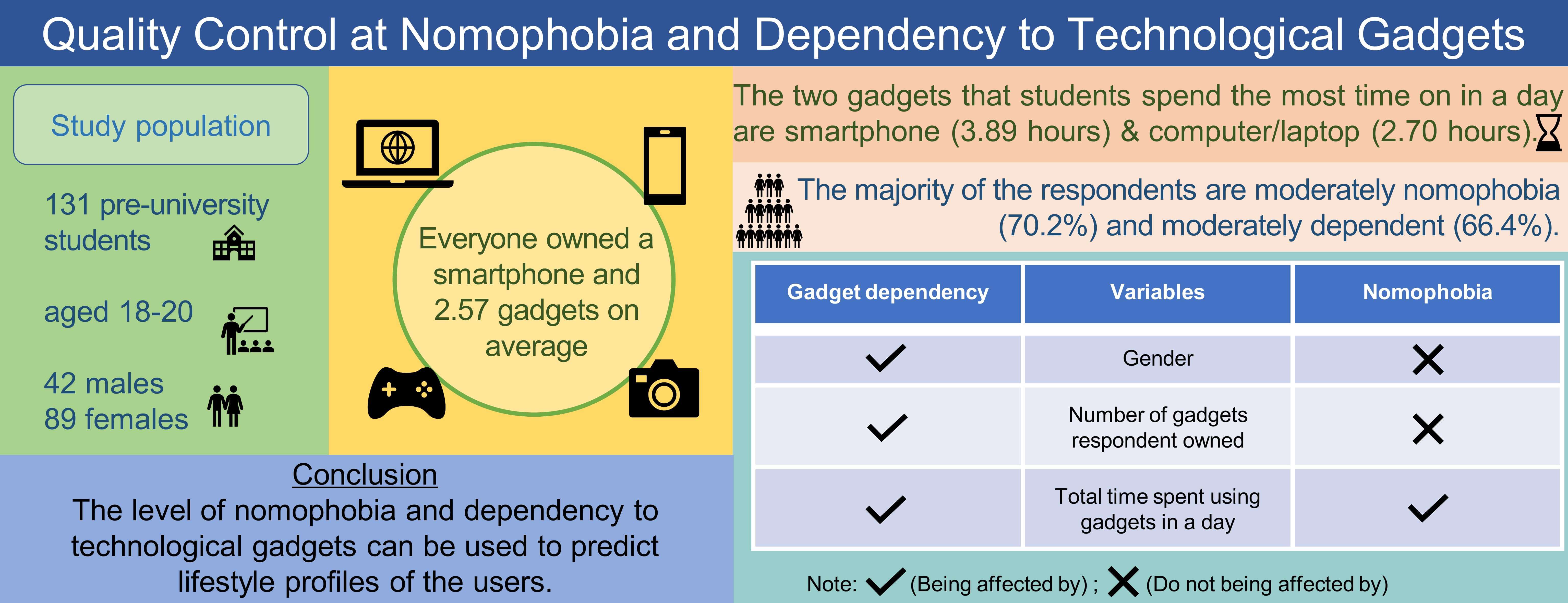 Open Access
Open Access
ARTICLE
Quality Control at Nomophobia and Dependency to Technological Gadgets
Pusat GENIUS@Pintar Negara, Universiti Kebangsaan Malaysia, Selangor, 43600, Malaysia
* Corresponding Author: Huay Woon You. Email:
International Journal of Mental Health Promotion 2023, 25(8), 891-901. https://doi.org/10.32604/ijmhp.2023.028205
Received 04 December 2022; Accepted 13 February 2023; Issue published 06 July 2023
Abstract
This study aims to investigate the phenomenon of technological gadget usage among pre-university students, which include the time spent using them, as well as their purpose and influence. A descriptive research design was adopted in this study. 131 pre-university students were randomly selected to answer a structured questionnaire. They were informed two weeks earlier to keep track on their time spent on technological devices, before answering the questionnaire. Findings showed that 99.2% of the respondents owned at least two technological gadgets, and all respondents own a smartphone. The main two gadgets that respondents spend at least 4 h a day on are smartphones (65.6%) and computers/laptops (21.4%). This indicates that smartphones are commonly used and owned among the respondents. The majority of the respondents are moderately nomophobia and moderately dependent on smartphones (70.2% and 66.4%, respectively). Correlation analysis demonstrates that the total time spent on gadgets in a day has a significant positive correlation with gadget dependency and total number of gadgets owned. Meanwhile, logistic regression was conducted to estimate the probability of nomophobia and dependency using total time spent and total number of technological gadgets. From the findings, it was demonstrated that when the total time spent on using technological gadgets increasing, there is greater probability that the respondents develop nomophobia and dependency. This indicates that nomophobia and dependency to technological gadgets can be used to predict lifestyle profiles. The use of technological gadgets can bring both benefit and harm to its user. In light of this, user has to remain rational in order to derive maximum benefit from it.Graphic Abstract

Keywords
Cite This Article
 Copyright © 2023 The Author(s). Published by Tech Science Press.
Copyright © 2023 The Author(s). Published by Tech Science Press.This work is licensed under a Creative Commons Attribution 4.0 International License , which permits unrestricted use, distribution, and reproduction in any medium, provided the original work is properly cited.


 Submit a Paper
Submit a Paper Propose a Special lssue
Propose a Special lssue View Full Text
View Full Text Download PDF
Download PDF Downloads
Downloads
 Citation Tools
Citation Tools